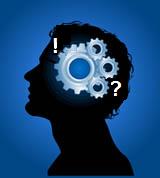Learning is about turning ? into !
Learning always starts with a question. Who?, What?, Where?, When?, Why?, and How? If you’ve ever been a student of journalism you’ll recognize the 5 “W’s” plus the “H” as the prime directive of all curious journalists. Maybe that’s why we still read the news because we learn something new or important about the world every day.
Questions and the Brain
None of this would be possible with the ?. And the ? would not be possible with the ability to imagine and see what is not there. In other words, the ability to think abstractly.
Imagine the following scene. A Neanderthal finds a cluster of red berries. He is hungry and eats some. He does not get sick or die. He shows the berries to his mate. He shows her that it is okay to eat them. She heads out and looks for the barriers. Since she has a mental picture of the berries in her head (an original work of abstract art) she can compare the red berries she sees with the ones she knows are okay to eat. She finds them and has lunch on a sunny patch of grass.
What just happened? The original hunter–gatherer found some berries and after using his stomach with which to experiment, learned that these particular berries were okay to eat. He then took some back to his mate and taught her what the berries looked like and how they tasted, and passed on the idea that they were okay to eat.
She learned and painted an abstract picture of those berries in her head and went to find them. She recognized a bunch, tasted one to make sure they were the same, and sat down for very berry feast.
Without the ability to think abstractly what would have happened? The first Neanderthal to eat would need to bring back a sample, show it to his mate, let her see they were okay berries to eat, and taken her by the hand to the berry bush where she could gather the exact same berries. Nothing to learn – no abstractions needed – just follow the berry bush road.
Here’s a wonderful factoid to support the idea. Neuroscientists had this idea that frustration builds brain connections in the Frontal Lobe where abstract thinking is believed to occur. They decided that driving in traffic was a frustrating experience. Finding your way around London was even more frustrating. So they scanned the brains of new cabbies and then after a year scanned them again. It was clear from the pictures of the brains that the frontal lobes had grown. They learned how to drive in traffic and find their way around olde London town.
Curiosity may have killed the cat but it sure made the cat smarter before it died.
So what does this teach us about learning and teaching? You need to be curious in order to learn. You do not need to be curious in order to remember and then forget what you memorized. Rote learning is just that – memorize, test and forget.
Real learning has ‘stickiness’. It stays with us. Here are 4 more related factoids.
When emotion is included, we tend to learn more effectively. Emotion is like a “PowerUp” in various video games. In this case learning is measured by being able to recall and use the knowledge and/or know-how long after the learning experience is over.
Vision trumps all other senses. We think visually before we encode language to help recall what we saw. Written words ARE visual. Lines and circles and squiggles and whatever else are A R T.
Spoken words are music. Do-Re-Mi-Fa-Sol-La-Ti-Do. We’re so used to thinking in terms of words that we just take them for granted. How you say what you say has an enormous impact on turning ? into !. An excited voices kindles the fires of curiosity.
Your brain is hardwired to listen to a good story. A good story has a hook at the beginning, a good middle and a clear ending. It will stay in your mind for a long time. If you think I’m wrong how many of you remember the stories you heard as a child? That’s a long time for many of you to remember. You can scaffold what you learn on the story, so it is, in a very real sense, a bridge for memory from now until you forget. A good story interweaves all of the above – emotion, visuals, dramatic voice(s) – into one BIG brainpunch. Just a final note for the moment, in the past, when we lived as tribes of hunter-gatherers, the best place at the fire was always held for the storyteller.

I love how the factoids you added at the end especially the emotions as the “powerups” when it comes to making learning stick. That’s one of the problems with corporate education today is that it is PC’d to the point where any emotion is taken out of he equation and the learning is flat.
Trying to not offend or be biased towards anyone you end up with education that bores the student to death. All the memorable programs I ever took formal or online had something powerful and emotional, Thanks~!!!
LikeLike